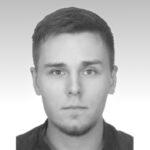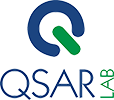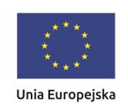
Prof. Tomasz Puzyn PhD, DSc
CEO, Scientific Director
World-renowned specialist in the field of chemoinformatics and environmental chemistry, co-author of fundamentals of computational nanotoxicology. Since 2008 he has been managing the Laboratory of Environmental Chemometrics he created at the University of Gdansk. Current research concerns the development of chemoinformatic methods for the design of nanomaterials and ionic liquids as well as an assessment of risk they may pose for human health and environment.
Prof. Puzyn is the author of 139 research papers, including publications in leading journals (e.g. Nature Nanotechnology, Green Chemistry), with a total IF of over 480, and an editor of 5 books published worldwide. He delivered over 25 invited talks abroad. His works have been cited more than 2’700 times and the Hirsch index is 30. He is an active member of the EU NanoSafety Cluster: coordinator of 2 projects implemented in the FP7 framework and a member of 7 HORIZON 2020 projects consortia. He cooperates with over 50 institutions from around the world. Laureate of the scholarship of the Japanese Society for the Promotion of Science, 3 FNP programs, MNiSW scholarship and the Polish Prime Minister's award for the postdoctoral achievement.
In the QSAR Lab Ltd. spin-off company, professor Puzyn acts as CEO and Scientific Director, being reponsible primarily for the operation of the Company in the area of research and development and for the scientific supervision of carried out services.

Paweł Bajurski
CFO – Managing Director
is a manager with 15 years of experience in the consulting industry, specializing mainly in consulting in the field of project management, business models and obtaining external financing. He has Project Management Professional (PMP) certificate, the most recognized certificate in the field of project management issued by Project Management Institute - an international institute associating project managers and PRINCE2 Foundation certificate. He prepared dozens of applications for subsidies from national funds (Operational Program Innovative Economy, national funds of the National Center for Research and Development) and foreign funds (EU 7th Framework Programme, Horizon 2020), acquiring over 150 million PLN.
He is primarily responsible for its business function: organizational, sales and financial aspects.

Dr. Alicja Mikołajczyk
Team Lider, Senior R&D Specialist
QSAR, ML and AI, advanced materials design, SSbD
Assistant Professor at the Laboratory of Environmental Chemometrics at Faculty of Chemistry at the University of Gdansk, Poland and a Senior Specialist R&D in QSAR Lab Ltd. She was on a series of internships abroad (e.g. USA, Ecuador). Her current research concerns the development of chemoinformatic methods for the design of efficient nanomaterials (especially hybrid and multi-component photocatalyst, nano-drug deliveries) as well as an assessment of risk they may pose for human health and environment. Dr. Mikolajczyk is the author of 30 research papers, including publications in leading journals (e.g. Chemistry of Materials, Applied Catalysis B: Environment, Nanoscale), with a total IF of over 200, and 1 book published worldwide. She delivered over 13 invited talks abroad. The achievement has been noticed by the international community. Dr. Mikolajczyk is one of the youngest researchers in Europe appointed as a leader of the project under Horizon 2020 (NanoInformaTIX) at University of Gdansk and PRELUDIUM10 project funded by National Polish Center. She is involved in 8 EU projects (under the FP7 Framework and HORIZON 2020) with a total budget of 34 mln EUR. She is a recipient of prestigious awards, including the scholarship of the MNiSW for the doctoral achievement and START fellowship granded by Foundation for Polish Science.
Dr. Mikolajczyk for the first time introduced QSAR/QSPR methodology for predicting hazard and physicochemical properties of more complex hybrid and multi-component nanomaterials at the early stage of its design. She coordinates research aimed at development of new methodologies to guarantee long-term nanosafety and contribute to fill current gaps in: Risk Assessment, Risk Management, and Risk Governance (RG) research for multi-component and hybrid nanomaterials, from its design and production by application into Nano-Enabled Products.

Dr. Eng. Anita Sosnowska
Team Lider, Senior R&D Specialist
QSAR, data analysis, nanomaterials risk governance
A graduate of the Faculty of Chemistry at the Gdańsk University of Technology (Biotechnology), where she obtained a PhD degree. The research area includes the development and implementation of computational chemistry methods and data analysis in the risk assessment of materials (including nanomaterials) and designing new safe substances.
Coordination of the research tasks under the RiskGONE project, managing a research team involved in the implementation of the project tasks. Coordination of the research tasks in commercial projects.

Dr. Eng. Karolina Jagiełło
Team Lider, Senior R&D Specialist
NanoQSAR-AOP, data science, machine learning
Assistant Professor at the Laboratory of Environmental Chemometrics at Faculty of Chemistry at the University of Gdansk, Poland. She specializes in data analysis and chemoinformatics, with particular emphasis on the development and application of efficient computational methods for designing safe materials (including nanomaterials). Currently, dr. Jagiello is developing the methodology for integration of NanoQSAR models with the NanoAOP appraoch in order to identify the structutal features of nanomaterials crucial for inducing transcriptomic response relavant for ENMs-specific adverse outcomes.
Coordination of research tasks within PATROLS project, leading the reseacrh team engagement in PATROLS.

Maciej Gromelski
Team Lider, Senior R&D Specialist
QSAR, nanomaterials risk governance, advanced machine and deep learning, programming, technology
A graduate of the Faculty of Chemistry at the University of Gdańsk, where he completed his doctoral studies and worked as a research assistant. A specialist in big data, machine learning / AI and programming. The area of his research includes the development and implementation of computational approaches for risk assessment of nanomaterials (nano-QSAR, cross-sectional estimation and clustering).
Coordination of research tasks under the Nano-QSAR Toolbox project, management of research team involved in the implementation of project tasks

Dr. Leonid Gorb PhD, DSc
Main specialist
Quantum chemistry, computational environmental science
Head of the Department of Quantum and Molecular Biophysics at the Institute of Molecular Biology and Genetics NAS Ukraine (Kyiv, Ukraine). His primary scientific interests are in Computational chemistry. Namely, it lasts in the ab initio computations of physicochemical properties of DNA and RNA fragments. Another direction he develops is computational environmental science.
Dr. Gorb published more than 200 scientific articles cited more than 4500 times). His h-index is 39.

Prof. Piotr Skurski PhD, DSc
Main specialist
Theoretical chemistry, quantum chemistry,
Professor of chemistry at the University of Gdansk (Poland) where he holds the chair of Theoretical Chemistry; professor of chemistry at the University of Utah (USA). He specializes in theoretical chemistry (quantum chemistry in particular). His research is focused on the electronic structure of molecular anions, investigating reaction mechanisms, designing novel molecules having tailored properties (e.g., superacids, superhalogens, strong oxidizers), and predicting physicochemical properties of various systems.
Prof. Skurski published 180 articles (cited more than 5'000 times), his h-index is 41.

Maciej Stępnik MD, PhD, DSc
Toxicology, nanotoxicology
Expert in the field of toxicology, nanotoxicology, safety assessment of nanotechnology products, assessment of health hazards from chemical substances, mechanisms of mutagenic and carcinogenic effects, application of alternative methods in toxicology.
Member of the Scientific Committee on Consumer Safety (SCCS) in Luxemburg (Working Group on Cosmetic Ingredients, Working Group on Nanomaterials in Cosmetics, Working Group on Methodology) and the Hearing Expert in the Cross-cutting Working Group on Genotoxicity at the European Food Safety Authority (EFSA). Member of the Interministerial Commission for the Highest Permissible Concentrations and Intensity of Factors Harmful to Health in the Work Environment. Member of the National Ethics Committee for Experiments on Animals (2009-2013). Chairman of the Łódź Branch and member of the General Board of the Polish Toxicological Society (2014-2017). Member of the editorial committee in: International Journal of Occupational Medicine and Environmental Health (IF = 1.541), Nanomaterials (IF 4.324), Editorial Board of Regulatory Toxicology (specialty section of Frontiers in Toxicology).

Krzesimir Ciura PhD, DSc
Data analysis, medical chemistry
A graduate of the Faculty of Pharmacy at the Medical University of Gdańsk, where he obtained a PhD, DSc degree. Expert in the field of pharmaceutical analysis and medicinal chemistry. He authored > 40 research articles and reviews related to biopharmaceutical analysis—Member of the reviewer board of Pharmaceuticals. His scientific interests focus on applying computational and chromatographic approaches to accelerate the drug discovery process. In particular, he is interested in the concept of biomimetic chromatography for the assessment of drug candidates.
His main research activities concern developing new methods that allow for rapid prediction of biological properties of small molecular xenobiotics.
At QSAR Lab. involved in data analysis and the implementation of project tasks.

Karolina Zięba PhD
R&D specialist
Homology modeling, molecular docking,
computer simulations
Dr. Karolina Zięba is a graduate on Forensic Chemistry Faculty of Chemistry Department at Maria Curie-Skłodowska University (MCSU) in Lublin. Dr. Zięba received her PhD degree in Theoretical Chemistry at Chemistry Department of University of Gdańsk. She specializes in modeling the hydrophobic effect using computational chemistry methods and in simulations of proteins and their complexes using the UNICORN coarse-grained force field.
At QSAR Lab, she participates in the work related to the development of the PeptAIm bioinformatics platform. In addition, she deals with the molecular docking of perfluoroalkylated substances (PFAS) to receptors.

Dr. Eng. Karina Kunikowska
R&D specialist
Data analysis, machine learning,
computational chemistry
A graduate of engineering studies at the Faculty of Electronics, Telecommunications and Informatics (major: Biomedical Engineering) and master studies at the Faculty of Chemistry (major: Biotechnology) of the Gdańsk University of Technology.
PhD in theoretical chemistry at the Faculty of Chemistry of the University of Gdańsk. Her area of scientific interest includes computational chemistry, in particular small-molecule chemical compounds. As part of her PhD studies, she dealt with the research of mechanisms of action of selected radiosensitizers - uracil derivatives and oxygen mimetics from the nitroimidazole group using the density functional theory (DFT) methods.
Currently focused on data analysis and risk assessment of new materials, including nanomaterials. Research team member involved in the implementation of project tasks.

Filip Stoliński
R&D specialist
Machine learning, molecular modeling, programming
A graduate of Master studies at the Intercollegiate Faculty of Biotechnology UG-MUG. His area of scientific interest includes computational chemistry, molecular modeling and machine learning.
Reasearch team member involved in the implementation of project tasks

Beata Judzińska
R&D specialist
Nanomaterials, data analysis, NanoQSAR-AOP
A graduate of the Faculty of Chemistry at the University of Gdańsk, engineering studies. Current master's student.
Reasearch team member involved in the implementation of project tasks.

Mateusz Balicki
R&D specialist
Data analysis, machine learning
A graduate from Faculty of Chemistry at Gdansk University of Technology. He has a degree in Chemistry with biological and medical chemistry specialization.
His area of interest includes computational methods in chemistry, in particular precise Ab Initio and DFT calulations to describe a hyddration and hydrophobic interactions between water and simple organic substances.
At QSAR Lab. involved in data analysis, machine learning and NanoSolveIT Project.

Dominika Kowalska
R&D specialist
Data analysis, machine learning
A graduate of the Faculty of Chemistry at the Gdańsk University of Technology (Technology of chemistry), engineering studies. Current master's student.
The area of her research includes data analysis and implementation of computational approaches for risk assessment of new materials.
Research team member involved in the implementation of project tasks.

Natalia Buławska
R&D specialist
Data analysis, machine learning
A graduate of the Faculty of Chemistry at the Gdańsk University of Technology (Technology of Chemistry and Material Engineering) and Medical University of Gdańsk – Faculty of Pharmacy (Pharmaceutical and Cosmetic Industry).
The area of her research includes data analysis and implementation of computational approaches for risk assessment of new materials.
Research team member involved in the implementation of project tasks.

Marta Swirog
R&D specialist
Data analysis, machine learning
A graduate of the Faculty of Chemistry at the University of Gdańsk, MA studies (Chemistry with a specialization in chemical analytics and diagnostics). From the early years of studies, associated with the Laboratory of Environmental Chemoinformatics, currently as a researcher.
Interested in using machine learning methods to study the behavior of nanoparticles in the environment.
At QSAR Lab involved in the implementation of project tasks.

Michalina Mudlaff
R&D specialist
Data analysis, machine learning
Graduated from the Faculty of Chemistry at the University of Gdansk with a master's degree (majoring in chemistry with a specialization in chemical analytics and diagnostics).
Her research area includes data analysis and implementation of computational methods for risk assessment of new materials.
Member of the research team involved in project tasks.

Szymon Zdybel
R&D Specialist
Data analysis, machine learning
A graduate of the Faculty of Chemistry at the University of Gdańsk (Chemical Business), engineering studies. Current master's student.
His research area includes data analysis and implementation of computational methods for risk assessment of new materials.
Member of the research team involved in project tasks.

Alicja Wojciechowska
Junior R&D specialist
Data analysis, machine learning
A graduate of the Faculty of Mathematics, Physics and Informatics at the University of Gdańsk. She has a bachelor's degree in Bioinformatics.
The area of her interest includes data analysis, particularly the use of machine learning methods to predict the toxicity of nanoparticles.
At QSAR Lab, involved in the implementation of tasks in the Nano-QSAR Toolbox project.

Kinga Nimz
Junior R&D specialist
Data analysis, machine learning
A graduate of the Faculty of Mathematics, Physics and Informatics at the University of Gdańsk in the field of bioinformatics. Her area of scientific interest includes the use of machine learning methods in the initial diagnosis of autoimmune diseases.
At QSAR Lab. involved in data analysis and machine learning. Research team member involved in the implementation of project tasks.

Patryk Ciborowski
IT specialist, GDPR inspector
Network engineering, IT systems
He has been related with the IT industry for over 5 years specializing mostly in system administration, network engineering, user support and systems implementation. He completed several Microsoft and Cisco certified courses.
In the company Patryk Ciborowski is responsible for administration, management and support activities associated with IT infrastructure.

Martyna Urbanowicz
Manager of R&D Projects Department and R&D Specialist
Corporate social responsibility
"Specialist in the field of environment protection, office co-ordinator and administrator. For 14 years, she has been related to administrative services for offices, and for 5 years associated with scientific and research units. She completed a number of substantive courses, including: AGILE PM, PMI project management, conflict management, team building and management."
In the company, she deals with the formal and financial service of project implementation as well as coordination and administrative service of the office.

Karolina Płonka
Marketing and sales manager
Branding, R&D projects popularization
For over 5 years professionally related with marketing and sales. She completed numerous courses substantively complementing her experience for example managerial skills course, Google Adwords and Analytics course. She has very well-developed communication, organizational and negotiation skills.
Within the QSAR Lab, Karolina Płonka is responsible for the popularization of R&D projects, PR, identification of the company, entire customer service (offer, negotiations) and all marketing activities.

Natalia Ryska
Management Board Office Assistant
European R&D projects, administration
Natalia is a graduate of the Faculty of Chemistry at the Gdansk University of Technology. Natalia graduated with an engineering degree in Technology of chemistry.
At QSAR Lab she is the management board office assistant.

Karolina Płonka
Marketing and sales manager
Branding, R&D projects popularization
For over 5 years professionally related with marketing and sales. She completed numerous courses substantively complementing her experience for example managerial skills course, Google Adwords and Analytics course. She has very well-developed communication, organizational and negotiation skills.
Within the QSAR Lab, Karolina Płonka is responsible for the popularization of R&D projects, PR, identification of the company, entire customer service (offer, negotiations) and all marketing activities.

Marzena Skowrońska, PhD
Projects development, implementation of new technologies
PhD in Chemistry at the Faculty of Chemistry, Maria Curie-Sklodowska University in Lublin. R&D Project Manager with 12 years of experience in the Life Science area, focusing mainly on design, development and implementation of new technologies. Designer/co-designer of several innovative solutions in the area of Medical Devices (covered by patent protection). Co-founder of technology start-ups in the Life Science area.
She completed numerous training courses in project and project teams’ management. Her main research interests include design and implementation of new technologies in the area of Life Science. Internal Auditor of Quality Management Systems and Environmental Management Systems.
In QSAR Lab she holds the position of Development Manager and Senior R&D Specialist.

Karolina Płonka
Marketing and sales manager
Branding, R&D projects popularization
For over 5 years professionally related with marketing and sales. She completed numerous courses substantively complementing her experience for example managerial skills course, Google Adwords and Analytics course. She has very well-developed communication, organizational and negotiation skills.
Within the QSAR Lab, Karolina Płonka is responsible for the popularization of R&D projects, PR, identification of the company, entire customer service (offer, negotiations) and all marketing activities.

Izabella Lubak
EU chemical regulations, ISO standards
Izabella is a graduate of the Faculty of Chemistry at the University of Gdańsk in the field of chemistry. She completed post-graduate studies in the integrated IT system SAP ERP.
From the very beginning of her career path, she worked in many areas of the chemical industry. She completed many substantive courses in the field of REACH, ISO 17025, ISO 9001 and ISO 14001.
At QSAR Lab she is the management board office assistant and R&D specialist.

